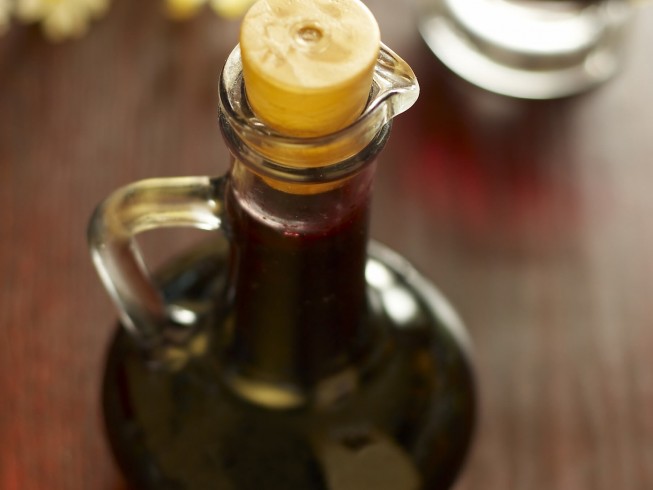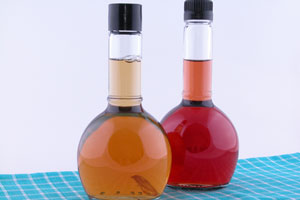This iconic whiskey is a "Jack of all trades" when it comes to cooking. Toss it in some pasta, as a savory dipping sauce, and even bake it into something sweet.

Flavored vinegar makes a wonderful addition to homemade salad dressings, or even a thoughtful gift! This blueberry variety would make a killer vinaigrette to dress up any summer salad.

6 cups cider vinegar
2 pounds blueberries
1/3 cup brown sugar
Wash berries; drain well.
Bring vinegar to a boil in a large stainless steel pot or ceramic saucepan. Boil for 1 to 2 minutes.
Put blueberries in a food processor. Pulse to chop coarsely. Transfer berries to a large jar or other glass container that holds about 3 quarts and has a lid (If you use a pitcher or other vessel that does not have a lid, cover with plastic wrap and secure with a rubber band).
Add vinegar and sugar. Stir to dissolve sugar. Cover and leave in a warm place for 2 to 3 weeks, shaking the jar from time to time.
Drain through cheesecloth, then line a funnel with a coffee filter and strain into clean, sterilized jars or glass bottles. Seal with a cork or standard canning lids.
Label and date. Use within a year.
jerseygal
Experiment with different types of berries or fruits to create flavor variations.
Add herbs or spices during the steeping process for additional flavor.
Use a glass container with a tight-fitting lid to prevent any contaminants from affecting the flavored vinegar.
For a stronger blueberry flavor, let the vinegar steep for a longer period before straining.
Apple cider vinegar is commonly used for making flavored vinegar due to its mild flavor that won't overpower the added ingredients.
You can use white wine vinegar, red wine vinegar, Champagne vinegar, rice vinegar, or regular white vinegar. They will yield a slightly different flavor but will still work in this recipe (use the same amount called for).
Yes, frozen blueberries can be used in place of fresh blueberries, just make sure they are thawed and well drained before processing.
The flavored vinegar is ready when it has developed a rich blueberry flavor after steeping for 2-3 weeks.
You can adjust the sweetness level by adding more or less brown sugar as desired.
Sterilizing the jars or bottles helps to prevent contamination and helps the flavored vinegar stay fresh for a longer period.
The blueberries will have lost most of their flavor after steeping in the vinegar, so it's best to discard them after straining.
Store the flavored vinegar in a cool, dark place away from direct sunlight to maintain its quality.
While the vinegar may still be safe to consume after a year, the flavor may degrade over time, so it's best to use it within the recommended timeframe.
Large Stainless Steel Pot or Ceramic Saucepan: For boiling the cider vinegar. A large pot is necessary to make sure there is enough space for the liquid to boil properly.
Food Processor: Used to pulse the blueberries until they are coarsely chopped, which helps release their flavor into the vinegar. If you don't have a food processor you can use a blender or coarsely chop them with a knife.
Large Jar or Glass Container: Should hold about 3 quarts and must have a lid. This is where the blueberries, vinegar, and sugar will be combined and left to infuse.
Plastic Wrap and Rubber Band (if necessary): If a jar without a lid is used, plastic wrap and a rubber band are required to cover the container securely.
Measuring Cups: For measuring the cider vinegar and brown sugar.
Cheesecloth: This will be used for draining the infused mixture.
Funnel: Helps in transferring the strained vinegar into clean, sterilized jars or glass bottles without spilling.
Coffee Filter: Used to line the funnel for additional straining of the mixture.
Clean, Sterilized Jars or Glass Bottles: For storing the finished blueberry vinegar. They must be prepared properly to maintain the vinegar's quality.
Summer Salad: Drizzle the blueberry vinegar over a refreshing mix of greens, goat cheese, and toasted walnuts.
Roasted Vegetables: Toss roasted Brussels sprouts or carrots with a splash of blueberry vinegar. The tartness will brighten the dish.
Pasta Salad: Combine cooked pasta, cherry tomatoes, basil, and a drizzle of blueberry vinegar for a zesty side dish.
Glaze: Turn the blueberry vinegar into a glaze for pork tenderloin or duck. Its sweetness caramelizes during cooking, adding richness to the meat.
Vinaigrette Base: Create a versatile vinaigrette by mixing blueberry vinegar with olive oil, mustard, and herbs. This dressing works well on grains or as a dip for crusty bread.
Gift Idea: Bottle up the blueberry vinegar in decorative jars to give as gifts.
This iconic whiskey is a "Jack of all trades" when it comes to cooking. Toss it in some pasta, as a savory dipping sauce, and even bake it into something sweet.
Love the spinach dip at restaurants like TGIFriday's and the Olive Garden? Make it at home with these easy-to-follow copycat recipes.
In a cooking rut? Try one of these taste-tested, family-approved recipes using ground beef.

Online since 1995, CDKitchen has grown into a large collection of delicious recipes created by home cooks and professional chefs from around the world. We are all about tasty treats, good eats, and fun food. Join our community of 200K+ members - browse for a recipe, submit your own, add a review, or upload a recipe photo.

reviews & comments
August 31, 2020
Made as directed and was very good.
August 1, 2014
Glad I did a test run of this first with just a small batch as I didn't care for the cider vinegar. I made it again with white wine vinegar and it was worlds better! Try that version!